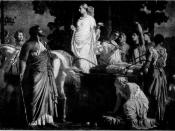The Odyssey is a Greek word meaning "the tale of Odysseus." Odysseus, the King of Ithaca; husband of Penelope; father of Telemachus; and son of Laertes was not able to return home after the war he was once in: the Trojan War. Stuck on an island, he is presumed dead. In his absence, suitors for his wife ruin his house with lavish feasts. This epic poem, by Homer, describes how Odysseus, with the help of the gods, gets home and regains his kingship. Justice is always harsh in the Odyssey; there is either no justice or a lot of it; the punishment however, is always severe. Justice in the Odyssey plays out among these characters: Odysseus and his crew, the suitors, Poseidon, Aeolus, Hyperion, Agamemnon, Aegisthus, Melanthius, Melantho, Telemachus, and Polyphemus. Each one of these characters does something wrong and receives a harsh punishment. In the Odyssey, justice, when done, always allots a large punishment, never a small one.
Aegisthus courted Agamemnon's wife and then killed him. The justice of the Gods is a swift and powerful one. However, Aegisthus had been warned: "we ourselves had sent Hermes, the keen-eyed Giant-slayer, to warn him neither to kill the man nor to court his wife" (pg. 4). Aegisthus ignored the warning, killing Agamemnon and courting his wife. Orestes, Agamemnon's son, killed Aegisthus to avenge his father's death. The gods saw this as swift, fair, and powerful justice: "And now Aegisthus has paid the final price for all his sins" (pg. 4). The suitors, led by Antinous and Eurymachus, expect justice to be served when Telemachus sails to Pylos without telling them. "[The] Suitors had embarked and were sailing the high seas with murder for Telemachus in their hearts" (pg. 69). They eventually found him, however they did not kill him...


